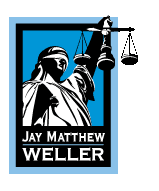 For those seeking bankruptcy information, the website of Weller Legal Group is arguably the largest source of bankruptcy information in these United States. This website, spanning well over one thousand pages, addresses every conceivable issue relating to bankruptcy and bankruptcy law.
For those seeking bankruptcy information, the website of Weller Legal Group is arguably the largest source of bankruptcy information in these United States. This website, spanning well over one thousand pages, addresses every conceivable issue relating to bankruptcy and bankruptcy law.
The main portion of the website contains information relating to Chapter 7, Chapter 13, Chapter 12, and Chapter 11 bankruptcy. Some of our clients tell us that they have read every page of the website, which seems to be an almost impossible task. This author often tells our clients that if they were to read and comprehend every portion of materials available on our website, they would know more about bankruptcy law than the majority of attorneys practicing bankruptcy law. It is uncertain whether such a statement is a testament to the benefits and information presented by the website or an indictment of the low level of expertise exhibited by such attorneys who practice bankruptcy law.
In addition, Weller Legal Group provides a least two articles per week, also available through the blog portion of the website, that address issues generally relating to bankruptcy law. Much effort is placed in creating and arranging these articles, in order that such articles provide useful information not only to our clients but to various persons who are investigating or studying matters relating to bankruptcy law and debt.
Weller Legal Group primarily practices bankruptcy law and represents only debtors. Our bankruptcy attorneys and counselors, however, are also trained and experienced in other matters relating to debt, such as credit counseling, credit repair, foreclosure defense, and mortgage modification and mediation. The concept presented by our office is that if one is confronted with any issue relating to debt, we have a program, and often a solution, to address that issue.
In addition, Weller Legal has offices throughout the Tampa Bay area, including Brandon, Clearwater, Port Richey and Lakeland. All offices are conveniently located in those cities, and in addition, are easily accessible to those outside those cities, who wish to obtain the services of our law firm.
If you are considering whether to file bankruptcy, there are two main forms of bankruptcy that are generally available to the majority of debtors who so file. Chapter 7 Bankruptcy is also called a straight bankruptcy or a straight liquidation. In a Chapter 7 Bankruptcy, most of our clients are able to retain most or all of their assets and obtain the elimination or discharge of their unsecured debts. Unsecured debts include credit cards, medical bills, signature loans, and other forms of debts that are not secured, or collateralized.
Chapter 13 bankruptcy is sometimes called a wage earner’s plan, a debt consolidation or a debt reorganization. Chapter 13 bankruptcy is often used by debtors seeking to stop a foreclosure on their home, or repossession of their automobile, for example, because a Chapter 13 bankruptcy will stop a creditor from taking or seizing such assets of the debtor, and permit the debtor to pay back any arrearages owed on such secured obligations over a period of up to sixty months.
In some cases, a debtor in a Chapter 13 bankruptcy may also adjust the terms of their automobile loan through a Chapter 13, whereby such debtor only pays the true secured, or fair market value of the automobile, through the Chapter 13 plan. A program called the mortgage mediation program is also available through the filing of a Chapter 13 bankruptcy, whereby the debtor can renegotiate the terms of his or her, home mortgage. In such instances, the debtor receives a permanent loan modification which continues past the expiration of the Chapter 13 plan.
A debtor may also file a Chapter 13 bankruptcy if his or her median income significantly exceeds the amounts presented in their jurisdiction. The calculation of median income is determined, not only by the income earned by the individual debtor but also by the number of persons present in the debtor’s household.
Finally, a debtor may file a Chapter 13 bankruptcy if a significant portion of his or her assets is deemed, non-exempt, and therefore subject to seizure by a Chapter 7 trustee if such person was to file a Chapter 7 bankruptcy. The debtor may pay the commensurate value of such non-exempt assets through a Chapter 13 bankruptcy over a period, again, not exceeding 60 months.
Image Credit :

